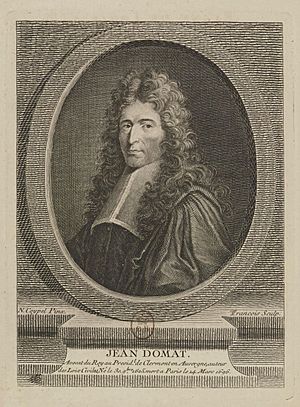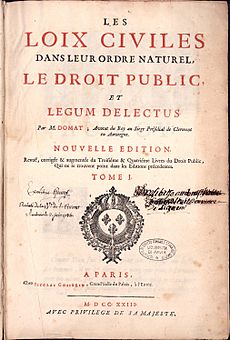Jean Domat facts for kids
Quick facts for kids
Jean Domat
|
|
|---|---|
 |
|
| Born | 30 November 1625 Clermont, France
|
| Died | 14 March 1696 (aged 70) Paris, France
|
| Education | Humanities, law |
| Alma mater | University of Bourges |
| Occupation | Jurist |
|
Notable work
|
Lois civiles dans leur ordre naturel and Le droit public |
Jean Domat (born November 30, 1625 – died March 14, 1696) was an important French lawyer. He is also sometimes known as Daumat. He helped shape the laws of France.
Contents
Domat's Early Life and Career
Jean Domat was born in Clermont, a town in Auvergne, France. He studied subjects like history and literature in Paris. There, he became good friends with the famous thinker Blaise Pascal. Later, Domat studied law at the University of Bourges.
After finishing his studies in 1645, Domat worked as a lawyer in Clermont. In 1655, he became a crown prosecutor. This meant he worked for the king to bring legal cases. In 1683, he stopped working as a prosecutor. King Louis XIV gave him money so he could focus on his writing and studies.
His Main Legal Work
Domat is best known for his big legal book called Lois civiles dans leur ordre naturel. This title means "Civil Laws in Their Natural Order." He published the first three parts in 1689. This book was very important across Europe.
King Louis XIV was so impressed that he gave Domat a regular payment. A fourth part, Le droit public (Public Law), was published in 1697, after Domat had passed away.
What Was the Book About?
Domat wanted to organize all the confusing old laws into a clear system. He believed that all laws should be based on strong moral and religious ideas. His motto was: "Man was made by God and for God."
His work tried to create a system of French law based on these moral principles. He took the old Roman laws, found in the Corpus Juris Civilis, and presented them in a new way. This new system was based on what he called "natural law."
Domat's book became a key source for the old French law system. It later influenced the famous Napoleonic Code. This code is still the basis for many laws today, especially in countries like Canada.
Editions of His Work
- Lois civiles dans leur ordre naturel, 1689
Later Life and Other Writings
Besides his main work, Domat also put together a selection of laws from the old Roman Digesta and Codex Justinianeus. This book was written in Latin and called Legum delectus. It was published in Paris in 1700, after his death. This book was later added to his Lois civiles.
Jean Domat died in Paris on March 14, 1696.
See also
 In Spanish: Jean Domat para niños
In Spanish: Jean Domat para niños
 | Janet Taylor Pickett |
 | Synthia Saint James |
 | Howardena Pindell |
 | Faith Ringgold |


